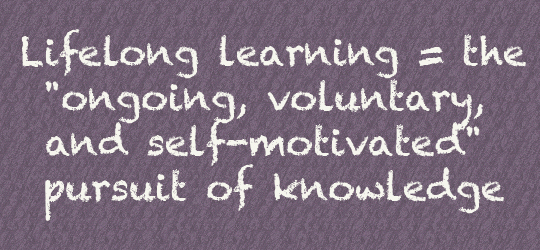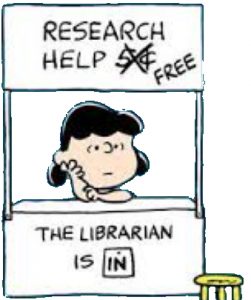
Teaching is an Exercise in Life-Long Learning and TLs can Help
Like any other profession, teaching is more than just a skill set occupation, meaning that the art of teaching itself is a skill but it is also a career of on-going, continuous learning, both in the content area of expertise and in the pedagogy of how best to get kids to learn. Because knowledge is constantly evolving and the sum total of information related to a particular subject area is improving, refining and being added to, Professional Development, like Professional Development in other professions, is used to constantly keep teachers up-to-date with their areas of expertise, and Teacher-Librarians (TL) can be there to help. Often this is related to TLs staying up to date on current trends in pedagogy or curricular changes and developments, but it also includes opportunities to stay abreast with the current changes in subject fields, such as the latest in genome theory for biology or new theories and evidence related to the foundation or expiration of ancient societies. Teaching is a constant exercise of life-long learning and it is that philosophy; that people will always be life-long learners, regardless of whatever occupation our students may grow into, that often drives and promotes our practices and lessons in our classrooms. TLs are in the unique position to foster life-long learning with not only the students, but the staff as well by facilitating opportunities to share and debate professional topics.

What Can Teacher-Librarians Do to Help?
Teacher-Librarians are in the unique position of being that collector of knowledge within a school setting. Their particular skill sets involving a cross-curricular knowledge base, the ability to vet, catalogue, and share appropriate resources that can be supported in the Learning Commons and the staff room. Teachers who are challenged with new curricular expectations can find assistance in a TLs who can help with alleviating or expediting some of the necessary “prep work” by directing them towards resources so that teacher efforts can be concentrated on working with student needs and implementing new practices. Often it is the TL who is the first to find a particular helpful resource, while maintaining a site of useful and vetted research sites for school staff and students. In this sense a TL can also become a curator of teacher/student friendly online resources.

Most importantly, Teacher-Librarians can facilitate discussions and foster “bottom up” professional development. Being a TL does not mean that one is just there to serve the educational needs of the students. TLs can be there to host and moderate professional online discussion boards or blogs, maintain a “staff room library” or even encourage opportunities to meet outside of the school setting to connect and share ideas, practices and experiences with each other. The school learning commons is a central hub for most schools and it is the ability and willingness to assist, share ideas, resources, and facilitate discussions or professional inquires that falls well within the “wheelhouse” of the modern Teacher-Librarian.
Bibliography
Fullan, Michael. Leading in a culture of change. John Wiley & Sons, 2007.
Henri, James, and Suzette Boyd. “Teacher librarian influence: Principal and teacher librarian perspectives.” School Libraries Worldwide 8 (2002): 1-18.
Orr, Greg. “Diffusion of innovations, by Everett Rogers (1995).” Retrieved January 21 (2003): 2005.
Riedling, Ann Marlow, Loretta Shake, and Cynthia Houston. Reference skills for the school librarian: Tools and tips. ABC-CLIO, 2013.
Scheirer, Bev. “The changing role of the teacher-librarian in the twenty-first century.” Acedido em 3 (2000): 16-19.
Bill, I agree with your idea about sourcing out relevant resources and doing the necessary prep work. I find that teachers tend to buy in more easily when the ideas are immediately applicable. There is so much out there in terms of professional development and resources that it can easily be overwhelming. Often, I find that if something is “going well,” there’s often little incentive to want to change current practice.
Bill, I appreciated your comment about how TLs can expedite or alleviate some of the necessary prep work that often bogs down teachers when planning a new unit or activity, by locating and providing relevant resources. As teacher-librarians, we can take a proactive stance in supporting our colleagues by initiating conversations about collaboration and offering to gather relevant resources for their upcoming units. According to the infographic entitled What Can Collaboration With A Teacher-Librarian Look Like? from the Surrey Teacher Librarians Association, there are three parts to collaboration: collaboration in preparation, in action and in reflection. We can take the lead on preparation by initiating conversations with teachers about upcoming units of study and assignments for which we can research and prepare materials by using our “specialized knowledge of texts and library collections and familiarity with OPAC searches to provide the resources most suitable to the task and learners involved” (Surrey Teacher Librarian’s Association, 2019, para. 4).
Surrey Teacher Librarian’s Association (BCTLA). (2019). “What can
collaboration with a teacher-librarian look like?” British Columbia Teacher Librarian’s Association. Retrieved from: https://surreychapterofthebctla.com/2018/12/17/what-can-collaboration-with-a-teacher-librarian-look-like/
This is a thoughtful and well-written post. I agree that the TL can alleviate some of that “prep” work for classroom teachers. We can do this by providing support to teachers new to a subject, curating resources to support learning, bringing people to collaborate, co-teaching etc. As you state, teachers’ focus should be concentrated on supporting the needs of their students. We as TLs can help ensure that it is.